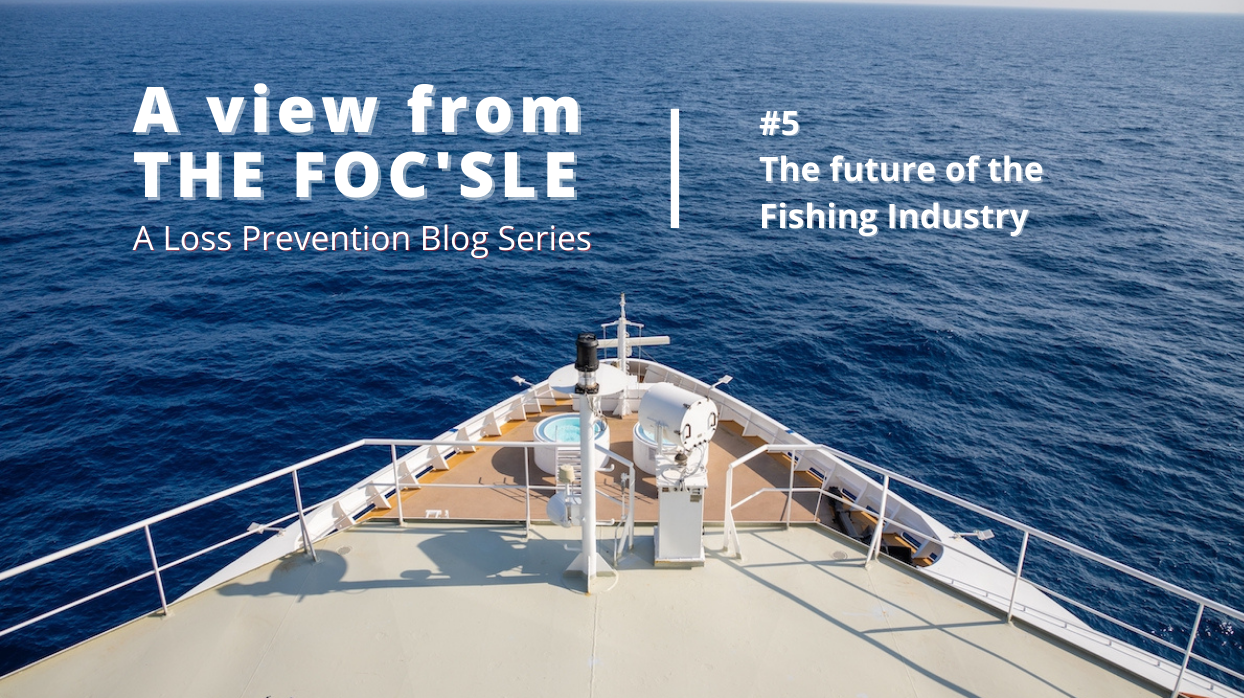
A view from the FOC'SLE #5: Future of the Fishing Industry
BLOG | September 2022
A warm welcome back onto the Foc’sle for another session with your Lookout Man!
It was rather stormy last time we met, but tonight the forecast is for calmer seas and some showers, which hopefully our Watchkeeper up in the wheelhouse will steer us safely around!
In our perhaps more buoyant mood, let’s look at what the future may hold for the fishing industry.
Firstly, we are assured that the demand for seafood products of all kinds will continue to grow. The big concern, however, relates to the ability of the global marine biomass to withstand these ever-increasing consumer demands.
Looking on the bright side, we can be comforted that some of the fishery management measures put in place to date have shown good results. These measures revolve in the main around Government control of the species, size, and volume of fish caught, with the issuance or withholding of licenses being the key management tool.
Fish stocks can thus grow, with the resulting economic benefits to the fisherman, the administering Nation, and ultimately, the family sitting at the table in a seafood restaurant.
But here is the snag, the licensing does not have a global reach and is only applicable in waters administered by either a littoral State or a Fishery Resource Management organisation. Further, enforcement depends entirely on the political will of the relevant management Authority, in addition to its economic ability to mount effective enforcement patrols.
Technology has helped to partially overcome this enforcement gulf, with AIS (Automatic Identification System) or VMS (Vessel Monitoring System) being commonly required by seagoing fishing vessels. In theory, these gadgets provide an almost instantaneous and continuous read-out of vessel data to the Flag State Fishery Manager. Although they cannot be switched off unless seals are broken etc, they are easily defeated by the simple expedient of placing a tin bucket over the antenna. Then if checked by authority, the gadget shows it has all along been working properly.
The hope is, and from my exposure to fishermen I believe it is a valid hope, that the ‘word gets around’ and the improved economics encourage wider compliance with Fishery Management Regulations. At the end of the day, boat owners and the fishermen themselves only go to the sea to make money. If compliance means that they can eventually make more money, they will be interested to follow.
Improved results due to the application of enhanced management will also encourage States, who are currently ‘wavering,’ to establish effective controls over their boats and their marine resources.
So above we can see the carrot. Now for the stick!
In the absence of any progress towards sustainably managing national fishing fleets or marine resources, there is the threat of sanctions being imposed by the main consuming nations. One South East Asian Nation was in fact sanctioned, and as no attempt was made to resolve the offending issues, the fish caught by that Nation’s boats are not acceptable in the main international markets. The national fishing fleet has atrophied and is now far behind its neighbours, technically and economically.
In the future, shall we expect to see a well-managed fishing fleet, perhaps smaller in number than we see today, catching a sustainable quantity of mature fish? Yes, I believe we will. But it will take time.
How does the aquaculture industry fit into this picture of the future?

A self-sustained floating fish farm for Indonesia.

The latest technology salmon farm for Norway

Indonesian seaweed farming
There have been, and in places still are, major ecological problems with fish farming. The leading nations in the industry, perhaps Norway and New Zealand to name but two, are well aware of the pollution caused by rearing fish in marine farms and considerable efforts are being made to overcome this. So, I am confident that we will see more, larger, and hopefully “greener” fish farms producing fish of a quantity and quality acceptable from economic and ecologic viewpoints.
Something that I think few may be aware of – seaweed. No, not the stuff scraped off the bottom of the ship in dry dock, but seaweed grown in coastal pens, and used for a myriad of purposes; food, pharmaceuticals, agriculture, and not at all reserved for that ancient breed of seaweed-eating Orcadian sheep! There are now many quite financially sophisticated projects running in various countries which enable littoral residents to develop successful businesses along these lines, very “green” and eminently sustainable, producing some 25 million tonnes annually. More to come, I believe.
I think that our watch is nearly over for today and I look forward to seeing you up here on the Foc’sle again next month.
I will be looking at the concerns that Owners and Managers now have regarding Ukrainian and Russian crews, particularly senior officers, and the possible impact this will have on the wider maritime industry.
Sincerely,
The Lookout Man

About The Lookout Man
Captain Jon Elliott
Capt. Jon began his seafaring career in 1960. He spent 11 Years in Taiwan running US Lines and then moved to Singapore in 1980 where he eventually joined Matthews Daniel in Singapore in 1989 and becoming Far East Managing Director. Capt. Jon started his own company Elliott Associates Pte Ltd after his retirement to bring an enhanced level of loss prevention to the Asian Marine industry. Capt. Jon is a consultant to Coastal Marine Asia Holdings Limited in our Loss Prevention Division providing technical guidance to our underwriters, whilst arranging crew and management loss prevention training for some of our insureds.
